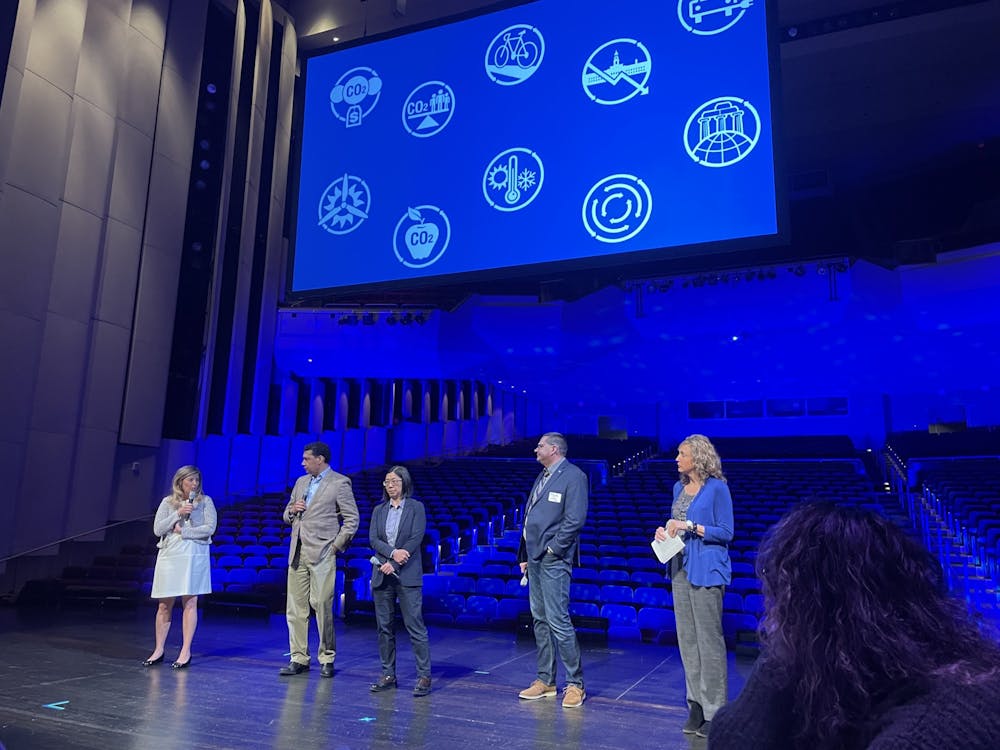UB’s climate captains came together on Earth Day to discuss the changes the university will need to make in order to reach its goal of net-zero emissions by 2030.
This goal is part of UB’s 10 in 10 initiative, which is made up of 10 groups that convene to discuss renewable energy resources, waste management and food-related carbon emissions, among other pressing topics. Each of these initiatives is led by a “climate captain.” The captains presented in front of event attendees — consisting of mostly university faculty and staff — about proposed changes and collected opinions through a series of polls.
Roughly 120 attendees — only a handful of students — from across the university sat at tables at the Center for the Arts’ Mainstage Theatre; each table was decorated with blue UB climate action pennants. The event began at 9 a.m. and included a complimentary, sustainable breakfast.
Beth Corry, captain of the “Put a Price on Pollution” initiative, said carbon pricing — paying for renewables or conservation to offset carbon emissions — would “help us incentivize actions that will help us reduce emissions.”
These strategies include considering how to reduce the level of commodity usage within the university’s buildings and understanding how new buildings will impact carbon emissions before they’re built.
The “Commute Responsibly” and “Electrify Our Ride” groups were led by Chris Austin, director of Parking and Transportation. Austin provided an update on the Stampede bus contract terms, which are set to expire in May 2022. He says the initiative is working on how to “finance and change” the Stampede bus fleet from “fossil fuel to electrification” or a “low-emission type of bus.”
Austin also polled attendees on potential changes to parking services.
“Parking lots make it convenient for car owners to get to and from campus quickly, but they also eat up a lot of green space, make the campus look less beautiful and foster a dependence on car usage,” he said.
The poll asked attendees if they would prefer to “expand parking” options, “decrease the number of parking spaces” to incentivize mass transit and carpooling, keep things the same or “provide reduced parking rates” for people who park at more distant lots and take the Stampede to class or work.
Fifty-six percent of respondents said they preferred expanding the number of parking spaces, while 31% would rather reduce the number.
“Nearly 30% of UB’s carbon footprint comes from us (faculty, staff, and students who are commuting) with fossil fuels,” Austin said.
The recycling, organics and trash (ROT) system pilot program at One World Café, which instructs diners to “sort their waste” into different bins, was highlighted by Tonga Pham, captain of the “Keep It Cozy and Green” initiative and vice president for University Facilities.
“The EPA estimates that materials in waste account for almost 40% of this country’s carbon footprint,” Pham said. “Our daily actions and decisions make a very big difference in trying to lower this number.”
The waste generated by food packaging was also questioned, with Pham asking participants if they would be willing to pay an upcharge of 34 cents per meal in order to move to a more compostable container, which they responded positively to.
Christina Hernandez, captain of “Taking Stock of Our Food System” and senior associate vice president for Student Life, cited One World Café as an example of “another jump forward in our efforts on campus to achieve zero waste, with a new focus on packaging and compostable alternatives.”
Hernandez proposed “implementing a carbon tax on unsustainably procured meat,” with “the revenue going to fund offset programs here in Western New York.” The audience response was mostly positive, with 47% voting for the “Sign me up — sounds like a great idea” option.
Other proposals included efforts to “decrease overall amounts of campus options containing meat by 25%,” and move toward initiatives like “Meatless Monday” or “Veggie Powered Monday.”
Participants raised several concerns during the Q&A portion of the event, including the impact of potential additional costs on students. Hernandez reassured attendees that the costs would be considered “holistically,” with other strategies being considered to “create efficiencies in resource allocation,” such as buying in bulk as a way to “balance our food costs across various commodities of food.”
An audience member also suggested providing free public transit passes to students, in an effort to make transportation more sustainable. Students in the Jacobs School of Medicine are currently provided NFTA bus and metro passes, but discussions with the NFTA to expand the initiative to students in other programs is still a work in progress, according to the climate captain.
While the attendees mostly consisted of staff members, student groups such as Citizens’ Climate Lobby (CCL) and Engineers for a Sustainable World (ESW) were also present.
“I think a lot of this discussion was focused toward staff and faculty, rather than students,” Veronica Cali, president of ESW, said. “I think a second event like this, but focused toward students, would be super beneficial.”
Amy Bentley, president of CCL, says that while the captains are “doing a lot of great work here,” more should be done to “make sure that they’re taking in all the ideas that we have, and making sure that they’re considerate of what we need as students.”
The news desk can be reached at news@ubspectrum.com





